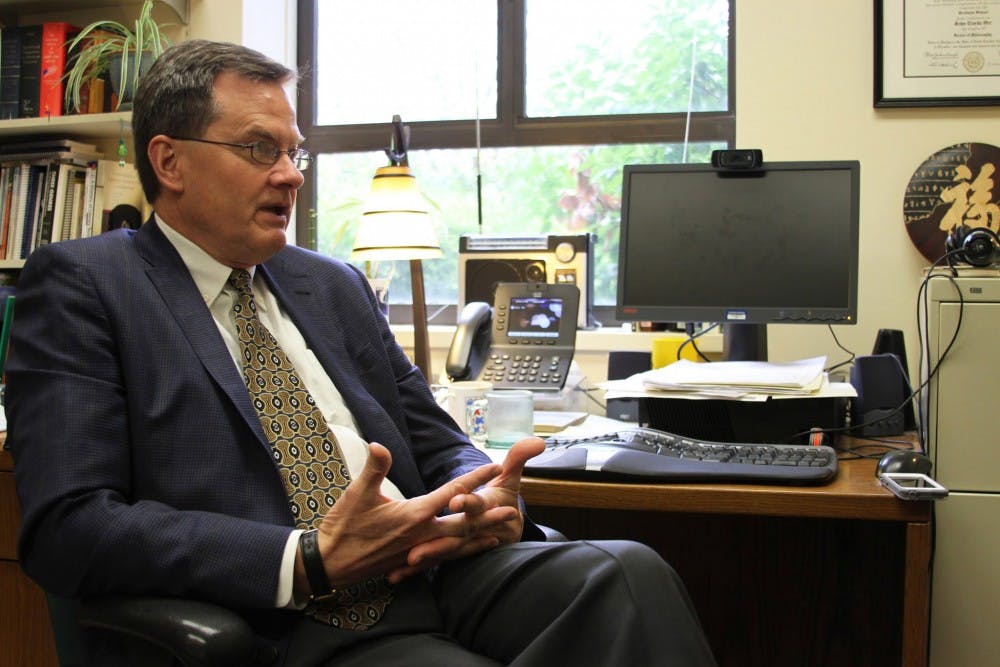McKena Miyashiro |
While still undergraduates, students in disciplines ranging from theatre to electrical engineering are doing research across the nation.
The Summer Research Symposium, which will take place from 5-7 p.m. on Sunday, Nov. 9 in The Commons, highlights the accomplishments of UP undergraduates engaging in research both on and off campus.
Junior Julia Meng, a biology and chemistry minor, helped organize the symposium. She will be presenting her summer research at MIT at the symposium.
Meng proposed the idea of the symposium to John Orr, an English professor and director of the Office of Undergraduate Scholarly Engagement.
“UP students are all over the nation doing research in labs, and I think that’s not known by very many people here,” Orr said. “Ideally, this is going to be a recruiting tool and a bunch of students are going to come in and say, ‘Why don’t I do that?’”
Brains and naming
Senior Brett Bankson, a French and psychology major with a neuroscience minor, will be presenting his summer research at the University of South Carolina. Bankson’s studies focused on language function in the brain for people with aphasia, or the disturbance of comprehension and expression of language in the brain.
Bankson worked on the “Name Game,” a video game that would help people with a specific type of aphasia. He studied people who are unable to name objects by going through recorded audio data and seeing how people made mistakes when they were naming objects.
“We were trying to see if this game would be feasible in people’s homes without having to come into a clinic for treatment, especially because most people with language dysfunction are generally older,” Bankson said.
On the side, Bankson was completing his own research using MRIs, which he will be presenting at the symposium. Bankson was interested in looking at how people perceive causal events and how people encode causality in language. He was able to design and implement the entire neuroimaging program during his nine-week stay in South Carolina.
“I had people look at a list of verbs and I looked at the parts of the brain that helps with perceiving and animation that are also parts of the brain implicated in change of state verbs,” Bankson said.
In the future, Bankson hopes to study neuroimaging and continue research in a laboratory setting.
“The first time I saw my brain on a scanner, I was like ‘woah, we can do that,’” Bankson said. “It’s just inherently exciting to me and I would love to do what I can do to be around that thing that makes me throw my hands up with excitement.”
Baby pigs and human disease
Senior Alex Quackenbush, a biology and math double major, will be presenting work she did this summer under the Murdock Undergraduate Collaborative Research Program. Quackenbush worked with a principal investigator at OHSU in a lab for ten weeks, where she studied a baby pig model and analyzed the effects of different chemicals on the body.
Quackenbush’s research falls under the category of molecular biology with a focus on developmental organs of health and disease. Her idea is that adult onset diseases have their origins in pre-natal development. Health conditions such as diabetes, cardiovascular disease, and hypertension are linked to certain conditions during pregnancy.
“I was looking at signaling cascades that control body growth,” Quackenbush said. “Those provide the motivation for the study and looking at what happens if you nutritionally program offspring and see what happens when they grow.”
Quackenbush plans to start a new club on campus with the goal of promoting research both on and off campus. She hopes students will share their knowledge and help other students with the process.
In the future, Quackenbush hopes to become a director of a research institution. Her interest lies in immunology, or the study of the immune system and how bodies respond to disease.
“Disease is integral to the human existence, and I kind of merge that with cancer biology since cancer is one of the oldest diseases known to man. I think that the immune system holds the keys to treating cancer, so that’s where I want my research to go,” Quackenbush said.
McKena Miyashiro is a reporter for The Beacon. She can be reached at miyashir17@up.edu.








